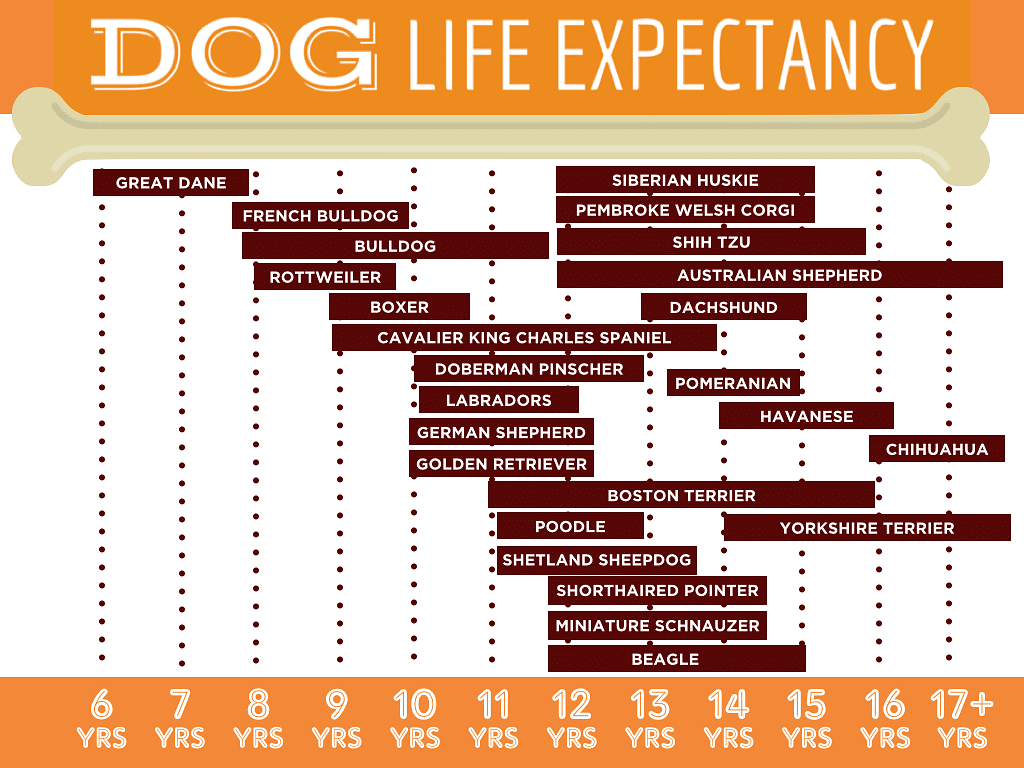This content was reviewed by veterinarian Dr. Elizabeth Racine, DVM.
When you purchase through links on our site, we may earn a commission. Here’s how it works.

Larger animals tend to live longer than smaller ones (most of the time). Think about it: humans live longer than cats, which live longer than a rat, which live longer than a fly. But why isn’t this true when it comes to animals within the same species, like dogs and even humans?
Looking at ourselves, a person who weighs 150 pounds will most likely live longer than a person who weighs 300 pounds. They live longer because of increased health risks for a person who weighs 300 pounds. The same goes for larger vs smaller dogs.
When it comes to dogs’ life expectancy, how can you compare a Great Dane to a Chihuahua? Their anatomic builds are completely different, and their lifespans reflect this. Beyond size, is there an average dog lifespan based on breed or other factors? Yes. I explore the answers to these questions: “How long do dogs live?” and “What is the dog lifespan by breed?”
- What Determines A Dog's Lifespan?
- Canine Genetic Age Testing With A DNA Test
- Dog Breed Life Expectancy Chart: 20 Most Popular U.S Breeds
- What Is The Longest Living Dog Breed?
- 10 Dogs With Short Life Expectancies
- Dog Breeds At Risk Of An Early Death
- How Can I Extend My Dog's Life?
- Frequently Asked Questions
- An Active Pup Is A Healthy Pup
- Why Trust Canine Journal
What Determines A Dog’s Lifespan?
Are you curious about ways you can help your pup live a longer, happier life? Below are some factors that help determine a canine’s lifespan.
Care
As an owner, you can impact the care you provide for your dog. Think of yourself as your dog’s parent. A dog with a proper, nutritious diet and exercise can live longer than one without. In addition, taking your furry friend to the veterinarian for annual wellness exams and getting her booster shots can result in a healthy dog with a longer lifespan.
Size
Research shows that larger dogs live for a shorter period of time compared to smaller ones. For example, an Irish Wolfhound (average 115 pounds) has an average lifespan of eight years, while a Jack Russell Terrier (average of 15 pounds) can live up to 13-16 years. Medium-size dogs like the French Bulldog live between 10 and 13 years. Below, you can see the average lifespan of dogs based on size.
- Small dogs: 10-15 Years
- Medium dogs: 10-13 Years
- Large Dogs: 10-12 years
- Giant Dogs: 8-10 years

Purebred Dogs vs Mixed-Breed Dogs
Inbreeding or pure breeding can reduce canines’ lifespans. Cross-breed dogs have a longer lifespan than purebred dogs due to greater genetic diversity. Purebred dogs are at risk of carrying genes for illnesses that are common to that specific breed. Further, “mutts” who have at least two breeds tend to have the fewest health problems and live longer than their purebred counterparts.
Not Sure Of Your Dog’s Breed Mix?
If you are unsure of your dog’s breed mix, try a DNA test kit to find out. Options like Wisdom Panel can give detailed insight into your pup’s breed as well as genetic health conditions. Learn more in our full Wisdom Panel review with personal experience.
Spayed Or Neutered
Spaying and neutering a puppy at a relatively young age can positively affect a dog’s lifespan. Most studies recommend surgical sterilization before five months of age for small breed dogs and 12-15 months for larger breed house dogs.
Studies suggest that these surgeries can help reduce the risk of some types of cancer in dogs — especially cancers affecting the ovaries, breast, and testicles.
Recent studies show that these benefits may or may not be completely accurate, but there is no question that your life will be easier without a litter of puppies, and this will be less stress on your pup, which could mean a longer life.
How Old Is My Dog In People’s Years?
We’ve all heard the old adage that dogs age seven years to every one human year. This is not an accurate measure. Dogs age differently than we do, so there is a little more to know. Learn How To Accurately Calculate Dog Years To Human Years
Canine Genetic Age Testing With A DNA Test
Do you want to find out your pet’s biological age? Embark makes it simple to determine your dog’s true age with its Dog Age Test which measures your pup’s DNA methylation. As your dog ages, the level of DNA methylation changes in a predictable way.
Embark uses the amount and position of DNA methylation as a type of “clock” to estimate age. Order a kit, send in your sample, and get the results back in four to five weeks. Visit Embark DNA’s website to learn more and buy a test.
Dog Breed Life Expectancy Chart: 20 Most Popular U.S Breeds
Below is a dog life expectancy chart sorted by the 20 most popular registered breeds in the US.
| 2023 Popularity Rank | Dog Breed | Average Lifespan |
|---|---|---|
| 1 | French Bulldog | 11-13 Years |
| 2 | Labrador Retriever | 11 years |
| 3 | Golden Retriever | 11 Years |
| 4 | German Shepherd | 11 Years |
| 5 | Poodle | 12-15 Years |
| 6 | Dachshund | 13-15 Years |
| 7 | Bulldog | 8-12 Years |
| 8 | Beagle | 12-15 Years |
| 9 | Rottweiler | 9 Years |
| 10 | German Shorthaired Pointer | 12-14 Years |
| 11 | Pembroke Welsh Corgi | 12-15 Years |
| 12 | Australian Shepherd | 12-18 Years |
| 13 | Yorkshire Terrier | 13 Years (possibly up to 20 years) |
| 14 | Cavalier King Charles Spaniel | 9-14 Years |
| 15 | Doberman Pinscher | 10-13 Years |
| 16 | Cane Corso | 9-12 |
| 17 | Miniature Schnauzer | 12-14 Years |
| 18 | Boxer | 9-10 Years |
| 19 | Great Dane | 6-8 Years |
| 20 | Shih Tzu | 10-16 Years |
What Is The Longest Living Dog Breed?
Small breeds with long noses are generally the longest-lived. Chihuahuas are usually referred to as the breed with the longest lifespan. They average 15-20 years and are one of the smallest dog breeds. In 2023, Spike, a Chihuahua from Ohio, was given the title of oldest dog living at the ripe old age of 24.
The Australian Cattle Dog is known for having one of the longest life expectancies. There are records of Australian Cattle Dogs that have lived 20 years or longer. In fact, the longest-living dog verified, according to Guinness World Records, was a female Australian Cattle Dog named Bluey, who lived 29 years and five months.

10 Longest Lived Dog Breeds
Recent research published in the journal Scientific Reports in February 2024 examined the longevity of companion animals. The researchers studied over 580,000 companion pups. This study revealed a wealth of information on the differences in breed life expectancy. The ten dog breeds that are least likely to have an early death and their average life expectancy are listed below, according to this research.
| Dog Breed | Average Life Expectancy |
|---|---|
| Lancashire Heeler | 15.4 Years |
| Tibetan Spaniel | 15.2 Years |
| Bolognese | 14.9 Years |
| Shiba Inu | 14.6 Years |
| Papillon | 14.5 Years |
| Havanese | 14.5 Years |
| Lakeland Terrier | 14.2 Years |
| Coton de Tulear | 14.2 Years |
| Border Terrier | 14.2 Years |
| Schipperke | 14.2 Years |
10 Dogs With Short Life Expectancies
You’ll notice that most dogs in this chart are larger breeds. As mentioned above, larger dogs tend to have shorter lifespans than smaller ones. Some believe this is because large breeds age more quickly. For example, a Great Dane can gain 100 pounds from its day of birth to its first birthday, whereas a Shih Tzu can weigh up to 15 pounds in its entire lifespan. Below is a table of 10 dogs with short lifespans.
| Dog Breed | Average Lifespan |
|---|---|
| French Mastiff | 5-8 Years |
| Great Dane | 6-8 Years |
| Bernese Mountain Dog | 6-8 Years |
| Irish Wolfhound | 6-10 Years |
| Neapolitan Mastiff | 7-9 Years |
| Leonberger | 8-9 Years |
| Newfoundland | 8-10 Years |
| Saint Bernard | 8-10 Years |
| Scottish Deerhound | 8-10 Years |
| Bloodhound | 9-11 Years |
Dog Breeds At Risk Of An Early Death
A breed’s average lifespan does not determine how long any individual dog is going to live. Some breeds are at a higher risk of early death, even if they have a fairly long expected lifespan. French Bulldogs, for example, though highly popular, are one breed to be aware of. While an adorable and fantastic pet, the Frenchie is predisposed to poor health. Due to their flat faces, this and other brachycephalic breeds are prone to respiratory issues.
The Caucasian Shepherd, Presa Canario, Cane Corso, Mastiff, Saint Bernard, Bloodhound, Affenpinscher, Neapolitan Mastiff, and Bulldog are other breeds identified in recent studies as having a high risk of earlier death.
Common Causes Of An Early Death For Dogs
Unfortunately, expected and average lifespans are just estimates. Many things can cause a dog to live less than its breed’s expected longevity. In dogs younger than two years old, infectious diseases, trauma, sudden illness, and congenital diseases are the leading causes of early death. Larger pups are more susceptible to cancer, which is the leading cause of early death in bigger breeds.
Canine obesity also affects lifespan and can cause early death. The Association for Pet Obesity Prevention estimates up to 59% of dogs in the United States, Canada, and Europe are overweight or obese. Research done by Banfield Pet Hospital shows that dogs can lose up to two and a half years of their lifespan if they are overweight.
How Can I Extend My Dog’s Life?
If you could give your dog medication to help keep her in your life longer, would you buy it? That’s precisely what Loyal is working on right now. Loyal is a team of vets, scientists, and dog lovers striving toward reducing underlying causes of aging in dogs and delaying disease by developing a drug.
Also, consider pet insurance for your pup to help extend their lifespan as much as possible by getting them vet care when needed without worrying about the cost. Insurance cannot directly increase your pup’s lifespan, but insured dogs often live longer because their owners take them to the vet when something pops up, which allows vets to diagnose and address a condition sooner. Read our pet insurance reviews to learn more and get a quote for your dog in our short form below.
There are other ways to help keep your dog healthy and help her live a longer life. The best thing you can do is give your dog adequate exercise daily and make sure you’re feeding them a healthy, well-rounded diet. All-natural, fresh dog food is gaining in popularity, and perhaps it’s something you’d like to consider for your pup. We’ve tried and reviewed some of the best dog food delivery services to help you decide if you’d prefer a more traditional kibble or fresh, homemade dog food.
Frequently Asked Questions
There are hundreds of questions about dog lifespan. Below, I’ve covered a few of the most frequently asked. If I didn’t get to yours, let me know in the comments.
Do female dogs live longer than male dogs?
In some cases, yes. Spayed female dogs live much longer than intact males. Spayed and neutered male and female dogs both live longer than those left intact. Among intact dogs, males tend to live a little longer.
Can a dog live 20 years?
In some cases, dogs can live 20 years, but that is a very old age for a dog. This leads to another question: “Can dogs live 30 years?” It is incredibly rare for a dog to live 30 years, but there have been claims of such. To date, none of these claims have been verified.
Does having puppies really shorten a dog’s lifespan?
This is a widespread theory but not necessarily true. Simply becoming a mother dog and carrying puppies does not shorten a female dog’s lifespan. Pregnancy comes with risks, and having puppies too early or too late in life can further the complications and risks. Learn more about dog pregnancy tests here. Older dogs are at a much higher risk of complications and even death during pregnancy. A dog’s overall health and care at the time of pregnancy are also factors.
An Active Pup Is A Healthy Pup
Regardless of breed, keeping your pup active will help them live a healthy and happy life. All breeds, regardless of size, need daily exercise. A daily walk is a special bonding time, keeps you active, and is good for your health, too. Learn more in our guide about how often and how long to walk your dog. We also cover step-by-step instructions on how to teach your dog to fetch. A simple yet timeless game, chasing after that ball never gets old and is top-notch canine exercise.
Why Trust Canine Journal
Danielle has shared a special bond with dogs since childhood. She has over 30 years of experience with breeds of all sizes and dogs with special needs. Danielle is a dedicated professional researcher and pet product reviewer. She spends countless hours researching the latest pet care, health, food, and training developments to help owners learn what’s behind the label.
Tagged With: Aging, Reviewed By Dr. Racine, DVM

